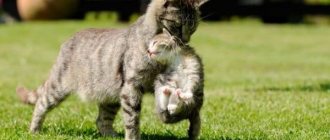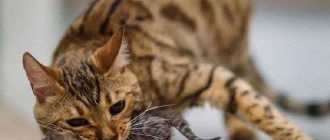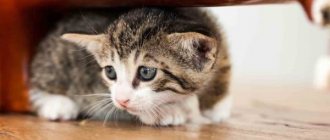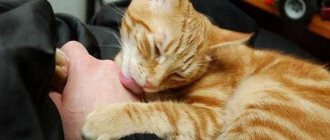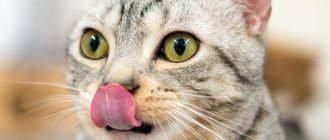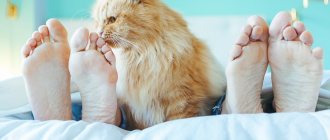The pinnacle of ownership is the moment your cat sits on your lap. Not all cats do this, but when they do, it's a special moment worth cherishing.
Cats sit on people's laps because they like warmth. Despite having fur, their body temperature is higher than ours, so they can tolerate higher levels of heat. Cats also enjoy the comfort and security that sitting on a lap provides. When a cat sits on you, it means that it trusts you. Cats are also encouraged by their owners' scents, affection, and the feeling of comfortable clothing. Sitting on your lap also calms and calms restless cats.
Never force your cat to sit on your lap or force her to stay there if she wants to get off. This will undermine your cat's trust in you and cause her to become stressed.
Why do cats like to sit on laps so much?
When cats nestle on their owners' laps, they stay there for hours. Not all cats are lap sitters, but this behavior is part of what makes owning a cat so special. There are several reasons why cats love claws, including:
Warm
Cats are descendants of desert animals, so they are drawn to warmth. Even though they have a fur coat, they do well when they are warm. Their body temperature ranges from 100.5 to 102.5 degrees, with an average of 101.5. This means they can handle the heat better and like to curl up on warm laps.
Safety
Some cats feel safer when close to their owners. According to a study published in the journal Current Biology, scientists found that cats form strong bonds with their owners, experiencing less stress as soon as they enter the room. Cats that form such strong bonds love to be close to their owners, and the lap is the safest place for them.
Attachment
Cats that feel attached to their owners seek affection and attention from them. Curling up on your lap is the perfect place for petting and cuddling, which many cats enjoy. The sweetest sensations are under the chin, behind the ears and along the back, so focus on touching these areas when petting a cat sitting on your lap.
Confidence
Having a cat sit on your lap is the ultimate sign of trust. Sleeping makes cats vulnerable because this is when they are most susceptible to attack. It also means that cats trust you enough to protect them from danger. To build trust, never force your cat to sit on your lap—wait until she wants to curl up. This way you will be sure that your pet is truly happy.
Smell and sound
Natural human sounds and movements, such as breathing and heartbeats, relax and calm cats, helping them fall asleep. You also have a unique scent that cats can pick up on. This is a kind of security blanket for your cat, allowing her to calm down and rest.
Comfortable clothes
If your cat sits on your lap when you wear certain clothes, chances are she's sitting on you because she likes the way it makes her feel. Fabrics such as fleece and towel robes that are warm and comfortable provide the mental enrichment cats need to thrive.
Calms Anxiety
If you have an anxious cat, sitting on your lap can calm her nerves and put her to sleep. Some cats are naturally more anxious than others, which may be a result of their background. However, they tend to build trust with only one person, refusing to sit on the laps of others.
Why does a cat sleep on a person: what do his postures and chosen place mean?
When a cat climbs onto your lap or lies down next to you, it shows its affection and affection. When a domestic cat sleeps in its owner's bed, it uses it as a warm place with a familiar smell. He is calmer when he feels the closeness of his owner, and at the same time the cat is sure that this is how he controls the person. According to another theory, a cat sleeps on a person or his things in order to absorb negative energy and relieve him of pain. This animal senses vulnerable spots and lies on the part of the body where it hurts and the temperature is high.
Cat and man
It is important for cats to take part in the life of the owner and be part of the events that happen. By lying down in a person's place, his clothes, or jumping into his arms, they feel in the thick of things, and with the help of smell they receive additional information.
When a cat rubs against a person and his things, she leaves her scent and accepts him as a member of her pack. Especially if the kitten was separated from its mother early, this is exactly how it perceives the person. The cat worries about him and if he senses problems in his body, he lies down on the weak spot, sharing his healing energy.
For reasons unknown to humans, a cat likes to fall asleep not in a cat house, but in a human bed or in a chair. Pregnant women most often experience discomfort when an animal sits on their stomach. They worry that the pet will cause harm by the pressure of its weight on the developing fetus. And some are afraid that the cat feels some kind of deviation. In fact, the animal is simply leaning against a warm and living place.
Pet behavior
If a kitten is used to sleeping in its owner's bed, this behavior becomes a bad habit for a domestic cat. It is difficult to wean him from getting into a person’s bed, although he has long stopped trembling and freezing. Having become an adult and independent (in his opinion), the cat still feels vulnerable during sleep. And since he sleeps most of his life, the owner’s smell calms him down and gives him a feeling of security. A person is many times larger than his pet, and the animal feels confident and invulnerable under his protection.
Why does my cat sit on my partner but not on me?
Cats often become attached to certain people, and usually those who feed them and give them the most attention. Cats prefer people who don't force them to sit on their laps and give them the space they need. There is a fine line between giving your cat too much and too little attention, and you should consider which side you are on.
Likewise, if you move around too much or are noisier than your partner, your cat will be more likely to sit on him rather than you. According to VCA Hospitals, cats have between 45 and 80 million scent receptors. This means that they can distinguish between your and your partner's smells. Your cat may be sitting on your partner because he prefers his scent.
Mark their “property”
Not only dogs are used to doing this. All animals have a developed sense of ownership. Moreover, what is important to them is not so much the house as the owner. It is to him that the pet becomes attached. The owner symbolizes comfort, warmth, and satiety. Therefore, cats try to be closer - this is how they “mark” their loved one.
It may not be obvious to you, but other animals will smell the scent you leave behind. When a cat gently tramples with her paws, she marks. There are sweat glands on the pads, which leave a characteristic odor. This happens even if the cat simply rubs its fur against you.
Why doesn't my cat sit on my lap anymore?
If something has changed in your cat's environment recently, she may feel too stressed or anxious to sit on your lap. This may be due to the following reasons:
- New pet
- The birth of a child
- recent move.
Additionally, if you have recently punished or yelled at your cat, she may develop a fear of you and lose the trust she once had to sit on your lap. Cats will stay away if they feel threatened, so it will take a lot of effort to regain your pet's trust before he sits on your lap again.
Unfortunately, cats will also stay away from you if you accidentally hurt them, such as by standing on their tail. Hopefully, over time, your cat will feel comfortable enough to sit on your lap again.
My cat sits next to me, but not on my lap
Just because your cat won't sit on your lap doesn't mean she doesn't want to be around you. Some cats are not naturally attracted to human laps and prefer to nest somewhere nearby. Being close to you provides the same security, affection and trust as sitting on your lap.
Shy and fearful cats are less likely to sit on your lap. The same goes for cats who don't like to be petted or petted too often.
Highest trust
Security and trust in our case act like twin brothers. What is security without trust? Experts point out the importance of one more issue: you should always give the purr the opportunity to choose. It is unlikely that a cat will sit blissfully on your lap if you forcibly scooped it up and distracted it from a more important matter. The main thing is that the pet itself jumps on its owner, pays tribute to politeness, and when it gets tired, it calmly leaves. This is exactly how a bridge of trust is built between a person and a cat (information for those who don’t know).
Why do some cats don't like to sit on your lap?
It's a great honor when cats choose to sit on their owners' laps. Unfortunately, this means that not all cats are meant to sit on your lap. Don't take it personally—you can still build a relationship with your cat, you'll just have to find other ways to enjoy her company. Here are the most common reasons why cats don't like sitting on laps:
Cats adopted as adults are much less likely to sit on their owner's lap, especially if they have a traumatic past or have previously lived outside. Kittens are easier to train and socialize, but many older cats prefer to keep their distance and enjoy human company from afar.
Why does a cat sleep on a person: what do his postures and chosen place mean?
Where the cat sleeps, there it hurts and other explanations of cat behavior.
